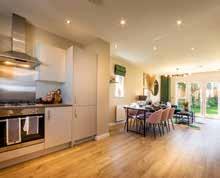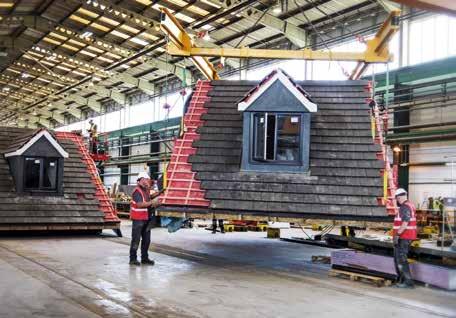
6 minute read
No Ordinary Homebuilder
ilke Homes is the Yorkshire-based company that has become a flagship name in the delivery of a new generation of energy efficient, low carbon, newbuild modular homes. We caught up with R&D Director Nigel Banks to talk about the latest developments.
1

Q: Since launching in 2018 ilke Homes has become a leader in offsite housebuilding and achieved huge success in a very short space of time – to what do you attribute this spectacular growth?
Nigel Banks (NB): By creating a suite of high-quality house types, we have been able to cast our net wide when it comes to partners. Since being founded five years ago, we have worked closely with institutional investors, private developers, councils and housing associations to engineer solutions to some of the industry’s most fundamental problems – like quickly increasing output while simultaneously reducing the emissions associated with the development process. Thanks to our pioneering lowcarbon solutions to house building, ilke Homes has already secured a pipeline that exceeds 3,500 homes, putting us well on course to become a top ten housebuilder within the next five years.
Q: The offsite construction sector has boomed over the last 3-4 years with many new entrants to the market plus recent business casualties as well – what is ilke Homes bringing to a busy offsite sector?
NB: Launched in 2020, our turnkey offering means we can take care of the whole development process – from acquiring sites and securing planning, through to development and housing delivery – on behalf of clients. Our land team, comprising FTSE 250 talent, has helped build our land-led pipeline, and secured some of the sector’s biggest deals to date – including one where ilke Homes was chosen by FTSE 100 firm Boots to deliver a 622-home scheme at the pharma giant’s former HQ in Nottingham.
Q: Factory-design and volumetric modular systems are one of many options available to unlock ‘net zero’ housing and reduce the construction sector’s carbon footprint – how is ilke Homes delivering its ilke ZERO brand
2
with sustainability, affordability and net zero targets in mind?
NB: Last year we announced our ilke ZERO commitment, which is rolling out ZERO carbon homes with ZERO bills guaranteed for residents. Delivered in partnership with renewable energy provider Octopus Energy, investor Gresham House and their shared ownership residential platform SO RESI, the first ZERO bills homes are being delivered in Stanford-le-Hope, Essex and represent the future of UK housing.
On top of the standard efficiency gains associated with factory-built homes – better insulation, with airtight precision-engineering and low thermal bridging – the ZERO bills homes also feature solar photovoltaics, air-source heat pumps (ASHP) and battery storage technology that combine to generate more energy that a home consumes. This, teamed with a bespoke energy tariff provided by Octopus Energy, will see residents

potentially save thousands of pounds on their annual energy bills as the energy price cap continues to eye-watering highs. With the UK’s housing stock – the oldest in Europe – accounting for 20% of Britain’s carbon emissions, and the cost-of-living crisis beginning to bite, the ZERO bills offering sets a precedent for UK housing which all housebuilders and providers should seek to emulate.
Q: Improving productivity is a common concern across the construction sector – and the UK generally – but how can factory-based manufacture and specifically ilke Homes’ volumetric modular systems improve productivity levels?
NB: The UK has a backlog of around four million homes, while the methods used to construct newbuild housing have remained largely unchanged for the last 100 years. These problems are compounded by the fact that traditional construction has a rapidly accelerating retirement rate. According to the Construction Products Association (CPA), the age demographic of construction workers across the industry is massively skewed towards those aged between 50 and 56, meaning that the sector is expected to lose about a quarter of its workforce within 10 to 15 years, regardless of the impact of the pandemic.
Because ilke Homes is more akin to a manufacturing business, rather than construction, we can draw from different talent pools – spanning digital design, advanced robotics etc. Meanwhile our ilke Academy is committed to training up the next generation of house builders at our factory in North Yorkshire. The techniques we deploy across our production lines mean we are able to create six homes a day, a feat of engineering. Also, with 90% of the build stage taking place inside a dry, factory-controlled environment, our construction programmes are not exposed to the elements that tend to slow down progress such as adverse weather conditions.

Q: The use of technology and digital tools within factory environments is central to offsite manufacture with additional rollout of toolkits, platform approaches, repeatable components and harmonised design – how is ilke Homes developing this Industry 4.0 approach?
NB: Building a modular home is fundamentally different to constructing one in the traditional way. The level of complexity and accuracy required alongside rigorous quality control requires a particular approach. Every dimension, tolerance, and offset needs to be precise and fully co-ordinated meaning significant information is required to articulate each module in fine detail.
Before the development of ilkeX, a collaboration with matterlab to improve the efficiencies of our manufacturing techniques, the process of taking the early designs and creating the fabrication and assembly content took a team of eight people within ilke Homes a period of three months to produce. This included 4,000 drawings required to manufacture a home using multiple design tools, while also relying on an interoperability workflow between software that simply doesn’t exist to the level ilke Homes require.
On top of this considerable amount of work, the introduction of robotics and machinery on the factory floor left little room for error and manual intervention. As ilke Homes strive to create the best homes available in the UK and with a new product line, the goal was to automate the production of all information relating to linings, fixings, framing, all openings in steel, plasterboard, sheathing board etc, then co-ordinate within a 2mm tolerance to allow for a full product range refresh in a single phase rather than one at a time. When matterlab and ilke Homes began to work together in 2020, they challenged themselves with finding a solution to the problem above by leveraging technology and automation to massively accelerate product revision cycle time, reduce errors, enable full virtual prototyping, integrate BOM and ERP, and digitally transform the end-to-end process. In June of 2021, a year after beginning this collaboration, modules designed and documented entirely from the software were built on the factory floor with precision-engineering and automated manufacturing. This introduced huge financial savings throughout ilke Homes and reduced errors in the overall process, reducing downtime on the factory floor which can cost upwards of £50k/day.
3
4
For more information visit:
www.ilkehomes.co.uk
Images:
01. Nigel Banks, R&D Director, ilke Homes 02-04. ilke Homes expertise draws from different talent pools – spanning digital design, advanced robotics and cutting edge modular design








